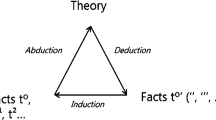Abstract
A fundamental question for philosophy of science asks, How is knowledge of the world created? A pragmatist approach is constructed to show how discovery and justification are tightly related during the creation of scientific knowledge. Procedural abduction, at the scientific level of Strict Abduction and higher, integrates the learnable (postulations undergoing conceptual development) and the logical (hypotheses undergoing rational scrutiny) quite thoroughly. Discovery and justification are functionally fused together within the organized process of procedural abduction by scientific communities. Four questions posed at the start are answered by this pragmatist philosophy of science as follows. (1) Is scientific creativity methodologically related to scientific justification? Answer: scientific creativity is integral to abductive procedures yielding scientific justification. (2) Can a distinction between genuine science and pseudo-science be clearly defined? Answer: genuine science is distinguished by the application of procedural abduction at the level of Strict Abduction or higher. (3) Does scientific knowledge achieve the legitimacy of scientific realism? Answer: procedural abduction legitimates the credibility of highly-confirmed hypotheses and hence justifies scientific realism. (4) How are scientific communities responsible for establishing scientific knowledge? Answer: scientific communities using procedural abduction realize (in both cognitive and constructive senses) scientific knowledge.
Access this chapter
Tax calculation will be finalised at checkout
Purchases are for personal use only
Similar content being viewed by others
Notes
References
Hintikka, J.: What is abduction? The fundamental problem of contemporary epistemology. Trans. Charles S. Peirce Soc. 34, 503–533 (1998)
Aliseda, A.: The logic of abduction: An introduction. In: Magnani, L., Bertolotti, T. (eds.) Handbook of Model-based Science, pp. 219–230. Springer, Cham, Switzerland (2017)
Brockhaus, R.: Realism and psychologism in 19th century logic. Philos. Phenomenological Res. 51, 493–524 (1991)
Peirce, C. S.: The collected papers of Charles Sanders Peirce, vol. 8. In: Hartshorne, C., Weiss, P, Burks, A.W. (eds.) Harvard University Press, Cambridge, MA (1931–1935, 1958). (Citations are to volume and paragraph numbers)
Peckhaus, V.: Psychologism and the distinction between discovery and justification. In: Schickore, J., Steinle, F. (eds.) Revisiting Discovery and Justification, pp. 99–116. Springer, Berlin (2006)
Pietarinen, A., Belluci, F.: New light on Peirce’s conceptions of retroduction, deduction, and scientific reasoning. Int. Stud. Philos. Sci. 28, 353–373 (2014)
Yu, S., Zenker, F.: Peirce knew why abduction isn’t IBE: a scheme and critical questions for abductive argument. Argumentation 32, 569–587 (2018)
Plutynski, A.: Four problems of abduction: a brief history. HOPOS: J. Int. Soc. Hist. Philos. Sci. 1, 227–248 (2011)
Anderson, D.R.: Creativity and the Philosophy of C. S. Peirce. Martinus Nijhoff, Dordrecht (1987)
Anderson, D.R.: The evolution of Peirce’s concept of abduction. Trans. Charles S. Peirce Soc. 22, 145–164 (1986)
Tschaepe, M.: Guessing and abduction. Trans. Charles S. Peirce Soc. 50, 115–138 (2014)
Tschaepe, M.: Gradations of guessing: preliminary sketches and suggestions. Contemp. Pragmatism 10, 135–154 (2013)
Shook, J.R.: Abduction, complex inferences, and emergent heuristics of scientific inquiry. Axiomathes 26, 157–186 (2016). Reprinted in this volume
Peirce, C. S.: The Carnegie application for logic research, Draft E” MS L75.163-173, held by The Peirce Edition Project at Indiana University Indianapolis (1902). Accessed online at http://arisbe.sitehost.iu.edu/menu/library/bycsp/L75/ver1/l75v1-06.htm
Shook, J.R.: Varieties of twentieth century American naturalism. Pluralist 6, 1–17 (2011)
Worrall, J.: The no miracles intuition and the no miracles argument. In: Dieks, D. (ed.) Explanation, Prediction, and Confirmation, pp. 11–21. Springer, Dordrecht (2011)
Shook, J.R.: Reasoning is communal in method and spirit. In: Thellefsen, T., Sorensen, B. (eds.) Charles Sanders Peirce in His Own Words, pp. 70–83. Mouton De Gruyter, Berlin (2014)
Magnani, L.: The Abductive Structure of Scientific Creativity. Springer, New York (2017)
Paavola, S.: On the Origin of Ideas: An Abductivist Approach to Discovery, 2nd edn. LAP Lambert Academic Publishing, Saarbrücken, Germany (2012)
Barrena S., Nubiola J.: Abduction, the logic of creativity. In: Bloomsbury Companion to Contemporary Peircean Semiotics, pp. 185–203. Bloomsbury, London (2019)
Park, W.: Abduction in Context: The Conjectural Dynamics of Scientific Reasoning. Springer, Cham, Switzerland (2017)
Hacking, I.: Representing and Intervening: Introductory Topics in the Philosophy of Natural Science. Cambridge University Press, Cambridge, UK (1983)
Giere, R.N.: Science Without Laws. University of Chicago Press, Chicago (1999)
Cartwright, N.: Nature’s Capacities and Their Measurement. Oxford University Press, Oxford, UK (1989)
Nickles, T.: The strange story of scientific method. In: Meheus, J., Nickles, T. (eds.) Models of Discovery and Creativity, pp. 167–207. Springer, Dordrecht, Germany (2009)
Snyder, L.J.: Hypotheses in 19th century British philosophy of science: Herschel, Whewell, Mill. In: Heidelberger, M., Schiemann, G. (eds.) The Significance of the Hypothetical in Natural Science, pp. 59–76. Walter de Gruyter, Berlin (2009)
Schickore, J., Steinle, F.: Revisiting Discovery and Justification: Historical and Philosophical Perspectives on the Context Distinction. Springer, Berlin (2006)
Whewell, W.: The Philosophy of the Inductive Sciences. J.W. Parker, London (1840)
Popper, K.: The Logic of Scientific Discovery. Routledge, London (1959)
Magnani, L., Bertolotti, T. (eds.): Springer Handbook of Model-based Science. Springer, Cham, Switzerland (2017)
Niiniluoto, I.: Truth-Seeking by Abduction. Springer, Cham, Switzerland (2018)
Author information
Authors and Affiliations
Corresponding author
Editor information
Editors and Affiliations
Rights and permissions
Copyright information
© 2021 Springer Nature Switzerland AG
About this chapter
Cite this chapter
Shook, J.R. (2021). Abduction, the Logic of Scientific Creativity, and Scientific Realism. In: Shook, J.R., Paavola, S. (eds) Abduction in Cognition and Action. Studies in Applied Philosophy, Epistemology and Rational Ethics, vol 59. Springer, Cham. https://doi.org/10.1007/978-3-030-61773-8_10
Download citation
DOI: https://doi.org/10.1007/978-3-030-61773-8_10
Published:
Publisher Name: Springer, Cham
Print ISBN: 978-3-030-61772-1
Online ISBN: 978-3-030-61773-8
eBook Packages: Religion and PhilosophyPhilosophy and Religion (R0)




